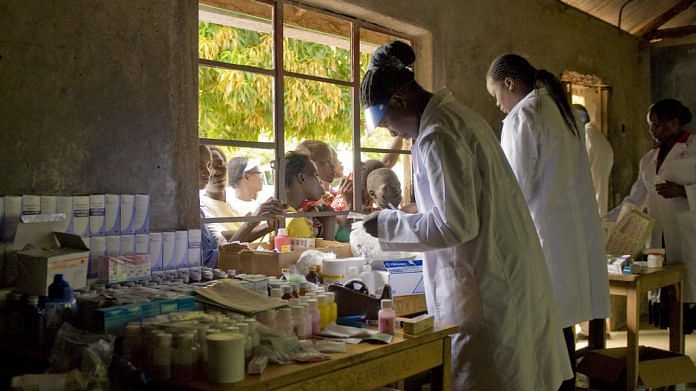New Delhi: Doses of the world’s first malaria vaccine are set to reach children in African countries as part of a large-scale pilot project launched this week, the World Health Organisation (WHO) announced Tuesday.
The vaccine — RTS,S or Mosquirix — offers partial protection against the parasitic disease that has been the scourge of developing nations for decades.
It was rolled out by Malawi, one of three African nations chosen for the pilot project, Tuesday, with the other two likely to follow in the coming weeks.
“The vaccine, known as RTS,S, will be made available to children up to two years of age… Ghana and Kenya will introduce the vaccine in the coming weeks,” the WHO said in a statement.
‘Reversed gains’
As many as 93 per cent of the world’s malaria-related deaths occur in Africa. Caused by the bite of the female Anopheles mosquito, malaria kills an estimated 2.5 lakh children in the continent every year.
Identified as the most potent parasitic disease, malaria claims the life of one child every two minutes. In 2017, according to WHO estimates, it killed 4.35 lakh people worldwide, most of them children. Of these, 4.03 lakh deaths were in Africa alone.
“We have seen tremendous gains from bed nets and other measures to control malaria in the last 15 years, but progress has stalled and even reversed in some areas,” said WHO director-general Dr Tedros Adhanom Ghebreyesus in a press statement Tuesday.
“We need new solutions to get the malaria response back on track, and this vaccine gives us a promising tool to get there… The malaria vaccine has the potential to save tens of thousands of children’s lives,” he added.
Also read: India pays more than any developing country on funding R&D for dengue, malaria, HIV
Malaria: On the decline in India, rising around the world
Since 2000, India has made major advances in reducing the toll of malaria, according to the WHO.
According to the UN health agency’s World Malaria Report 2018, India reported almost 30 lakh fewer malaria cases in 2017 as compared to 2016, a drop of almost 24 per cent.
As of 2017, India accounted for just 4 per cent of the world’s total cases, with the 24 per cent decrease taking it out of the top three countries with the highest malaria burden.
However, the overall scenario across the world was different. According to WHO data, malaria appears to be making a comeback, with 21.9 crore cases in 2017 against 21.7 crore in 2016.
To control the spread of the deadly disease, the pilot programme in Africa will generate evidence on the broader use of the malaria vaccine. The programme is designed to throw up results about reduction in child deaths, vaccine uptake, and vaccine safety in the context of routine use. Based on these results, the WHO will expand the availability of the vaccine across the globe.
The vaccine took three decades to develop
According to the WHO, RTS,S is the first — and to date, the only — vaccine that has demonstrated the capability of preventing malaria in children.
“In clinical trials, the vaccine was found to prevent approximately 4 in 10 malaria cases, including three in 10 cases of life-threatening severe malaria,” the WHO said in its statement.
The vaccine has been developed and manufactured by the British pharma giant GlaxoSmithKline (GSK), which is donating up to 10 million vaccine doses for the pilot project in Africa.
The company created Mosquirix in 1987, and it has since undergone years of tests.
“Delivering the world’s first malaria vaccine will help reduce the burden of one of the most pressing health challenges globally,” Dr Thomas Breuer, chief medical officer of GSK Vaccines, was quoted as saying in the WHO press statement.
“We look forward to seeing the results of the pilot, and in parallel, are working with WHO and PATH (a non-profit engaged in health equity efforts) to secure the vaccine’s sustained global health impact in the future,” he added.
Also read: Latest tool in fight against malaria: Dogs that can sniff out malaria from our socks



